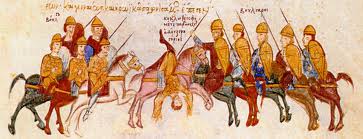Almost exactly 20 years ago, Greece hosted the Men’s Junior World Handball Championship in Athens. Now the turn has come to the second city of Greece, Thessaloniki, a city of prominence both historically and in modern Greece. Over the centuries, many important battles have been fought in the area. Let us hope that the battles on the handball courts over the next two weeks will be less bloody, although I am sure that they will be dramatic enough.
Handball has a rather modest existence in Greece, at least in comparison with football and basketball. PAOK and Aris are great rivals from the host city in both those sports, and they have also had some success at the continental level. However, the conspicuous lack of spectators (except when the home team was playing) during the opening days, suggests that handball in July is not a favorite activity of the locals. And of course, they currently have more fundamental issues to worry about and more important things to spend their money on.
The Junior World Championship tends to be a very interesting event for many reasons. You can see the players who will be the stars on their national teams some years from now. And it is exciting to see how the traditional styles of the adult players from different countries can be recognized also among their young talents. Moreover, for many of the players it is their first time in an intercontinental event, and you will see some interesting ‘cross-cultural’ clashes in terms of tactics, style, and mentality. The 2011 event promises to be as thrilling as many of its forerunners.
It seems a bit premature to start picking favorites after just two games per team. Moreover, the main conclusion is rather that there will be many heated battles in each preliminary group, as teams are fighting for positions for the ‘1/8-finals’, where teams from ‘neighboring’ groups will be playing 1-4, 2-3, 3-2 and 4-1. So it is critical to try to gain one of the top positions in the group, and this will guarantee interesting match-ups until the end of the group play, even if in some groups the two teams that will be going to the ‘consolation round’ are already becoming known.
In group A, there was the traditional battle between France and Tunisia today, and despite playing a careless style that caused many 2-minutes penalties, Tunisia was able to use a better scoring power to win rather easily in the end. But Tunisia already lost against Slovenia, whereas France gained a point against a solid Norwegian team that today went on to defeat Serbia. France may be living dangerously here if they do not improve.
Denmark is the likely favorite in group B, despite having to fight until the finish line in order to defeat Algeria. The Algerians played with speed and tenacity today, after having had a rather modest game yesterday against the less experienced home team. Argentina lost today against Qatar, but both teams have a good chance to advance to the 1/8-finals. I could see either Qatar or Algeria causing some surprises at later stage. Newcomer Venezuela will find it hard to win a game here.
In group C it would be easy for Benin to feel a bit overwhelmed. Here we have had battles today between perennial top teams Russia vs. Germany and Korea vs. Egypt, while Benin themselves tried to put up a brave fight against Brazil. Germany played a smart and systematic handball against opponents looking like an old Soviet style team. There is some special interest here in the sense that the Germans are coached by Martin Heuberger in his final effort with the juniors, before he takes over the senior German team. Korea has a quick but small team, and after an 8-4 lead they got ‘outmuscled’ by the strong and physical Egyptians. At half-time it was 13-13, but soon it went from 16-16 to 17-24. It would be not be surprising if the Koreans join Benin in the consolation round.
Iran just might be able to fight successfully against Hungary on the final day of group play, if one judges from the results so far. Sweden has been a bit slow in pulling away from Iran and Canada in their games, but in the end they won comfortably. Spain seemed to be more convincing after an unexpectedly easy win against Hungary, but after today’s Hungarian fiasco against Portugal, perhaps the Spanish strength still remains to be tested. The next two games, against Sweden and Iberian rival Portugal will tell us more.
As John mentioned in his posting earlier today, we have webcasts of very high quality from Greece, but the crux is that you have to be available to catch the games live. The more intriguing games tomorrow, in the early afternoon my time here in the Washington area, are Qatar-Algeria, Argentina-Greece and Russia-Korea. Then, after a rest day on Wednesday, you will need to check the standings in each group to find your best match-ups for Thursday and Friday, but during a couple of time slots you may need to have two computers going!
